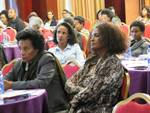Social Watch E-Newsletter - Issue 217 - June 5, 2015
Published on Fri, 2015-06-05 16:50
 |
| Issue 217 - June 5, 2015 |
|
|
|
| |
| |
|
| |
Lost in indicators: How the “experts” are rewriting the SDGs |
| |
|
| |
Almost one third of the targets that define the 17 Sustainable Development Goals approved by the governments at the UN are being de facto rewritten or deleted by the Inter-Agency Expert Group proposal of “priority indicators” published June 1 in New York. Important notions included in the SDGs such as labour rights, women rights to property, financial services, inheritance and natural resources and many commitments of developed countries to support the efforts of developing countries are excluded from the proposed list of indicators and would therefore not form part of the UN reviews of the new development agenda. Read more.
|
| |
|
| |
Goals and targets left behind
|
| |
|
| |
This table is compiled from quotes of the Sustainable Development Goals as proposed by the Open Working Group and endorsed by the UN General Assembly as the basis for the new development agenda and the “First proposed priority indicator list” compiled by UNSD in preparation of the first meeting of the Inter-Agency Expert Group on SDGs, New York, June 1 and 2, 2015. Read more
|
| |
|
| |
|
| |
The post 2015 process will result in the adoption –by Heads of States at the United Nations on September– of a set of universal and transformative Sustainable Development Goals (SDGs) and targets. The success of this agenda is also connected to the outcome of the discussion on indicators, which is taking place within the Inter-Agency Expert Group and the UN Statistical Commission.
One of the innovations brought by the SDGs is the inclusion of a Goal on peace, justice and inclusive institutions (Goal 16). As for all the others goals and targets, the selection of the indicators will be critical to ensure effective accountability and implementation. Read more
|
|
| |
|
| |
|
| |
 |
Speakers at the Public Forum on “Africa Rising: Promise or Challenge for gender equality?” provided a sharp critique of the idea of “Africa Rising”, pointing to its origins in an increasingly discredited neoliberal paradigm with its emphasis on trickle-down growth. The hype around recent growth rates in Africa does not sufficiently address the implications of a pattern of growth that is deeply dependent on the export of primary commodities, that gives short shrift to job creation and investment in human development, underplays rising inequality and social tensions and conflicts, and pays lip service to gender equality and women’s human rights. As Professor Manuh said, drawing on data thrown up by the ECA’s African Social Development Index and the “Cost of Hunger” study, “Yes, Africa is rising, but for whom?” The Forum was organized by Development Alternatives with Women for a New Era (DAWN) together with the Network of Ethiopian Women’s Associations (NEWA) that was held in Addis Ababa. Read more
|
|
| |
|
| |
|
| |
 |
Currently, negotiations on bailout deals and Greek economic reform are taking place between the Greek government and its creditors (the IMF, the ECB, and EU member states). Previous budget cuts and other austerity measures intended to reform Greece’s economy, combined with privatizing public services, have done anything but lead to growth. Instead, austerity measures have led to an economic and humanitarian crisis in Greece. One in four people is out of work. Youth unemployment stands at 60 per cent. Child poverty in Greece grew to 40.5 per cent in 2015 from 23 per cent in 2008, while cuts to health services have led to devastating social and health consequences. In fact, because of the conditionality that accompanied the financial support of its creditors, Greece was found to have violated the right to social security due to the austerity measures it imposed, according to the European Committee of Social Rights Imposed economic adjustment measures can often have devastating effects on the exercise of human rights, and this link underlines once again the importance of raising sufficient domestic revenues for states to be able to respect, protect and fulfill human rights. Read more
|
|
| |
|
|
|
| |
|
SOCIAL WATCH IS AN INTERNATIONAL NGO WATCHDOG NETWORK MONITORING POVERTY ERADICATION AND GENDER EQUALITY Social Watch >>
Social Watch E-Newsletter For comments, sugestions, collaborations contact us at: socwatch@socialwatch.orgTo stop receiving this newsletter send a message with the subject "unsubscribe" to: socwatch@socialwatch.org |
|
|
|
SUSCRIBE TO OUR NEWSLETTER
Submit
|
